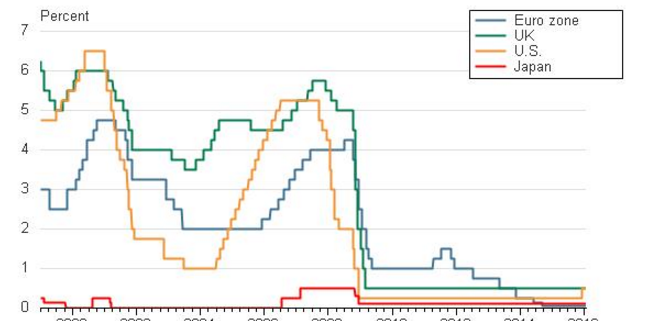How do central bank rates affect your portfolio?
It’s often headline news, especially among financial outlets. Apparently whether the US Fed will “raise rates” and by how much seems to be under conjecture and discussed at length and with nail biting anticipation. But how does a 25 basis point (0.25%) increase, or any rate change at any central bank, that seems to occur so far away mean to the individual investor?
“Central banks are the regulatory bodies that oversee the monetary policy of their relevant nations,” explains Richard Cayne. “Part of the policy would be to ensure currency stability and economic growth, so what how a central bank interprets and implements a nation’s monetary policy will not only affect that country’s finances, but it would also potentially impact those of any party that has any economic relationship with it.”
This will inevitably have a trickle down affect to your investments and to how they will perform.
While central banks have a range of tools to employ to control their nations economic and financial health such as by buying and selling financial instruments in the open market or by creating money through quantitative easing, a common method is through raising or lowering their country’s official interest rates (such as the Bank of England’s Bank Rate and the US Federal Reserve’s federal funds rate).
Central bank interest rates: the extreme basics
Among the previously mentioned tools are reserve requirements. Most central banks will require banks and certain other financial institutions under their jurisdictions to maintain a certain reserve level. This is meant to guarantee that these entities have enough liquidity to withstand sudden financial shifts, crises, or panics. These official policy rates are applied to the reserves held by the banks, but they will also determine the interest rate for banks that cannot meet the reserve requirements and need to borrow funds, either from the central bank or from another financial institution.
This, in turn, will affect how a financial institution uses its own funds. How much money do they have available to invest in loans and other instruments, what interest rates should be for consumer and corporate loans, from credit cards to major project financing. The idea would be that, the lower the rate, the more attractive it would be for borrowers to pursue loans or to finance purchases of all sorts, instead of just squirrelling their money away in savings, thereby stimulating the economy.
In extreme examples, such as in Sweden and Japan, the rates are in the negative. This means the central bank will charge financial institutions for any money not in circulation, more or less discouraging holding more reserves than necessary.
So, what does this mean for you?
Beyond your credit card rate and the interest on your mortgage, the availability of a specific currency will inform how companies will invest – expanding or contracting as they determine the best reaction to that nation’s monetary policy/interest rate. This can also increase or decrease a currency’s exchange rate, which itself can impact financial markets.
For example, recent rumours about another US Fed rate hike has strengthened the US dollar as people shore up their US dollar assets. A higher US Fed rate means the US dollar will be worth more compared to other currencies that have lower rates from their central banks. And those buying US dollars (and raising their value) are betting that the raised rates, along with other monetary policies, will not increase inflation that would offset any foreign exchange gains.
As you can see just by this short attempt at an explanation, the simple act of raising or lowering a central bank rate has wide spread implications. And no matter the actual impact, there is no denying that, at the least, they do have a psychological impact, affecting how people feel about, and whether they trust, certain markets and currencies.
To learn more about various nations’ central bank’s monetary policies, they do their best to explain, including:
The Bank of England: https://www.bankofengland.co.uk/monetarypolicy/Pages/default.aspx
The US Federal Reserve: https://www.federalreserve.gov/monetarypolicy/default.htm
The Bank of Japan: https://www.boj.or.jp/en/mopo/index.htm/
Or, get in touch with Richard to discuss how economic policies will affect your portfolio and how best to allocate your assets.



